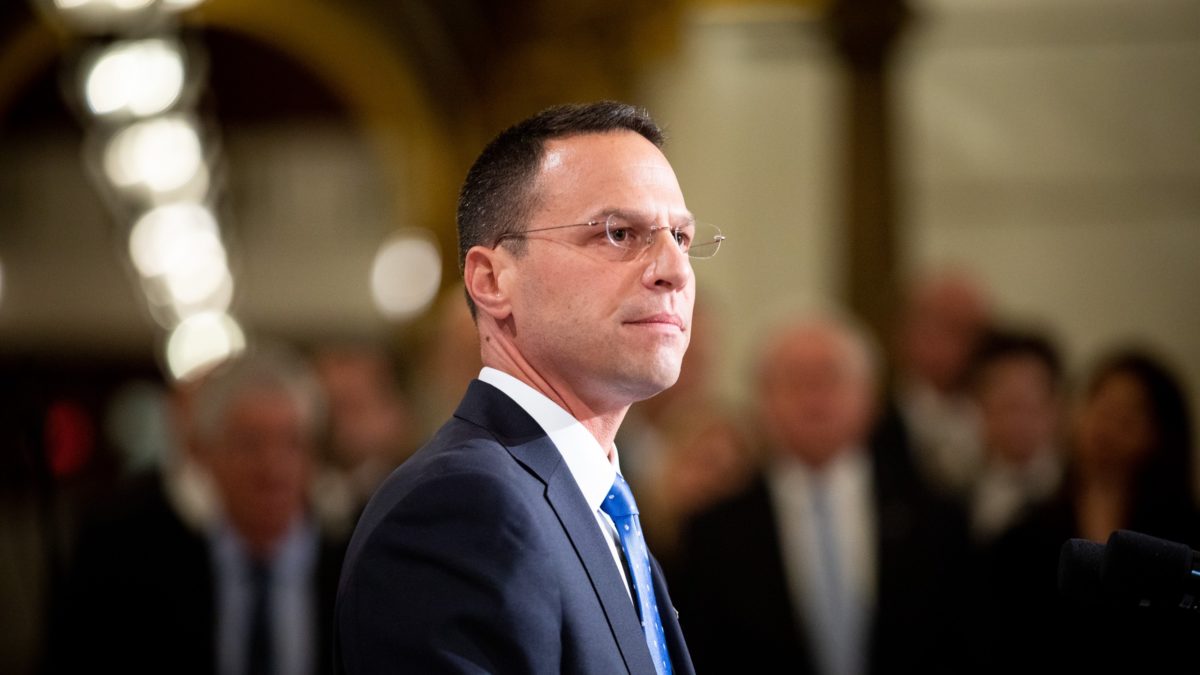The Editors: PA GOP needs to show why it exists
Since the McCain-Feingold campaign finance law was enacted in 2000, the influence of political parties has waned while the importance of independent groups like PACs has spiked. Nowhere is this political evolution more apparent than within the Pennsylvania GOP, where smoke signals sent from party insiders indicate their hesitation to endorse a candidate for governor, lieutenant governor, or senator at the state party committee meeting this weekend.
This reluctance raises the question: Why does the party still exist?
In 2020, spending by outside groups nationwide totaled nearly $3 billion compared to $51 million in 2000, according to Opensecrets.org. Here in Pennsylvania, individual campaigns and PACs regularly outdo the state party in fundraising, marketing, and even in advocating for public policy goals. This makes the state GOP come off as an awkward relic of decades past — a third wheel unfitting for these times of anti-establishment fervor.
READ MORE – The Editors: Krasner and city must list forensic technologies he claims will curb homicide crisis
“I sure wish Trump would just endorse,” said the chair of the Northampton County Republican Party to Reuters regarding the Senate race. “It would make this whole thing a lot easier.”
Indeed, ceding the ability of Pennsylvania Republicans to endorse their own candidates to the former president and current Florida resident would be easier, but is it the right thing to do?
With fifteen candidates running for the Republican nomination for governor and twelve running for the Senate nomination and none of them garnering a formidable level of support by any measure, the state party is at a crucial juncture — whether it knows it or not. Trump will undoubtedly wait to endorse anyone until an apparent leader has emerged, thanks to his recent misstep with Sean Parnel, who was forced to drop out of the race after domestic abuse allegations derailed his candidacy. And without any current indication of who that frontrunner could be, the likelihood that the contests devolve into months-long slog is high.
Individual candidates who have no chance of winning a general election will hold on indefinitely if they can raise funds through their small PACs. And as the primary edges closer, the desperation of candidates to earn time in the spotlight will lead to increased divisiveness and attacks. In the end, voters in the general election could be left with a Republican nominee who made it to the general with a small plurality of votes and who plainly does not represent the beliefs of most GOP voters.
Voters in the general election could be left with a Republican nominee who made it to the general with a small plurality of voters and who plainly does not represent the beliefs of most GOP voters.
So, the state Republican party has a clear choice on February 5th. It can either make the difficult effort to transparently choose candidates to endorse for each statewide race and remain a relevant institution in the years to come, or it can slip further into insignificance by failing to do one of the last things in politics which it is capable of doing.
We understand that both parties’ past endorsement processes have been rife with accusations of corruption and backroom dealing. But having a broken system does not mean the correct answer is to abandon it altogether, or for parties to continue squandering time and resources as passive shells of themselves. Such inaction will merely lead to candidates for the most important offices in our commonwealth being chosen by the loudest — and often most incoherent — faction of activists.
Instead, it is important for both parties to reform their endorsement processes to make them indisputably transparent to voters. Of course, not all voters will like the ultimate choice. But the goal of endorsements is not to avoid the fury of the loudest factions, it is to give the party’s opinion of who the best candidate is for the job and then let voters make the final choice in the primary. Otherwise, voters are to be expected to make an informed choice about a dozen or more candidates for each office — an assumption far beyond realistic.
This is not to say that making endorsements is the cure-all for ailing political parties. A strong party acts as a united front after honestly considering the opinions of its many factions. It will advance core principles both by putting forth quality candidates who honor those principles, competently supporting those candidates in elections, and working alongside elected officials to turn shared principles into law (not tweets).
Too often the Pennsylvania Republican Party fails on all counts. Instead, its communications appear to focus solely on petty quips engineered for the internet, which gives the party an air of triviality.
However, it is clear that the Pennsylvania Republican State Committee can at least take a first step toward showing its voters why it should continue to exist. This weekend it should act with the unifying leadership that these divisive times call for. The party should deliberate and endorse a candidate for each office from among a herd of contenders, and then make every effort to prove to the rank-and-file that it is and will be a competent institution that represents their shared values.
Broad + Liberty is a non-profit media endeavor dedicated to sharing voices and stories that are shut out of other media outlets. Ideas matter, and as a 501 c(3) nonprofit we rely on the generosity of donors like you to support our work. Please invest in us here. @broadandliberty





The flawed McCain-Feingold campaign finance law is really at the root of it all. If individuals have a stated dollar limit on individual campaign contributions, then the law should be amended in such a way as to enforce at same dollar limit on organizations. The way the law is currently castrated PACs have too much power and can leverage too much money. There has to be a better way.
According to the Republican appointed SCOTUS members at the time (and their defenders in right-wing media), corporations are people and limiting the dollar amount organizations can spend “limits their free speech”. That’s what every Republican was arguing to defend the disastrous Citizens United ruling. You don’t oppose free speech do you!? Of course progressive groups have been trying to fight that ruling and its flawed logic but you’re not allowed to agree with them – they’re progressive!